| Srl | Item |
| 1 |
ID:
157714
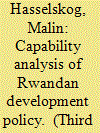

|
|
|
|
|
| Summary/Abstract |
This article provides a capability analysis of Rwandan development policy. It is motivated by impressive progress on human development indicators in combination with highly centralised policymaking, giving ambiguous signs regarding a capability approach. It is based on extensive original empirical material, along with large numbers of official documents and academic sources. The analysis is structured around three issues that concern the relation between individual agency and government policy, and that are debated among capability scholars as well as in relation to Rwandan development policy: participation, transformation and paternalism. The finding that Rwandan development policy reflects an approach very different from a capability approach is not surprising, but establishes that the assumed link between human development indicators and the capability approach needs to be questioned. This brings our attention to shortcomings in any quantitative measurements of development, or in the use of and importance attached to them, as well as to the problem of assuming that certain outputs go hand in hand with certain processes. While this is valid for contexts far beyond Rwanda, it also sheds light specifically on the polarisation that exists in the scholarly debate on Rwanda
|
|
|
|
|
|
|
|
|
|
|
|
|
|
|
|
| 2 |
ID:
085184
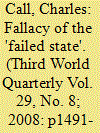

|
|
|
|
|
| Publication |
2008.
|
| Summary/Abstract |
This article examines the origins and evolution of the concepts of 'failed' and 'failing' states, arguing that the terms have come to be used in such widely divergent and problematic ways that they have lost any utility. The article details six serious problems with the term 'state failure' and related terms like 'fragile' or 'troubled' states, concluding that analysts should abandon these terms. It concludes with a modest attempt to develop alternative concepts and principles for thinking about diverse states that pose varied challenges for academic analysis and policy makers
|
|
|
|
|
|
|
|
|
|
|
|
|
|
|
|
| 3 |
ID:
145732
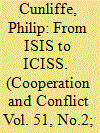

|
|
|
|
|
| Summary/Abstract |
In light of the post-intervention crisis in Libya, this article revisits critically the vision of the Responsibility to Protect (R2P) offered in the 2001 report of the International Commission on Intervention and State Sovereignty (ICISS) – frequently taken as the conceptual bedrock for R2P doctrine. It is argued that the perverse effect of ICISS doctrine is to replace political responsibility with paternalism. The demand that states be made accountable to the international community ends by making states accountable for their people rather than to their people. The argument is developed across five critical theses. These include claims that R2P changes the burden of justification for intervention, that it usurps popular sovereignty in favour of state power, and that it diffuses post-conflict responsibilities. The article concludes that pre-emptive ‘human protection’ efforts risk crowding out questions of systemic transformation, i.e. what kind of an international order we want to live in.
|
|
|
|
|
|
|
|
|
|
|
|
|
|
|
|
| 4 |
ID:
174508
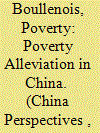

|
|
|
|
|
| Summary/Abstract |
Since taking office, president Xi Jinping’s government has granted massive funding to what has become China’s strongest poverty-reduction campaign ever. Based on the study of detailed budgets in eight rural counties, as well as ethnographic and interview data in a ninth county, this article explores how poverty alleviation programs shape the distribution of power and resources in rural China. It argues that poverty alleviation in rural China predominately focuses on infrastructure investment and support to the local economy, rather than on social insurance, education, and household subsidies. Support to local companies, the article argues, entails co-opting established enterprises, rather than supporting new entrepreneurship among poor households. Overall, the Chinese approach to rural poverty alleviation highlights the emergence of a state-sponsored corporate paternalism that strengthens local hierarchies of wealth and power.
|
|
|
|
|
|
|
|
|
|
|
|
|
|
|
|
| 5 |
ID:
141645
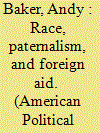

|
|
|
|
|
| Summary/Abstract |
Virtually all previous studies of domestic economic redistribution find white Americans to be less enthusiastic about welfare for black recipients than for white recipients. When it comes to foreign aid and international redistribution across racial lines, I argue that prejudice manifests not in an uncharitable, resentful way but in a paternalistic way because intergroup contact is minimal and because of how the media portray black foreigners. Using two survey experiments, I show that white Americans are more favorable toward aid when cued to think of foreign poor of African descent than when cued to think of those of East European descent. This relationship is due not to the greater perceived need of black foreigners but to an underlying racial paternalism that sees them as lacking in human agency. The findings confirm accusations of aid skeptics and hold implications for understanding the roots of paternalistic practices in the foreign aid regime.
|
|
|
|
|
|
|
|
|
|
|
|
|
|
|
|
| 6 |
ID:
095795


|
|
|
| 7 |
ID:
140668


|
|
|
|
|
| Publication |
New York, Orbis Books, 1974.
|
| Description |
xii, 177p.hbk
|
| Standard Number |
0883444356
|
|
|
|
|
|
|
|
|
|
|
|
Copies: C:1/I:0,R:0,Q:0
Circulation
| Accession# | Call# | Current Location | Status | Policy | Location |
| 017807 | 968.9104/KAP 017807 | Main | On Shelf | General | |
|
|
|
|